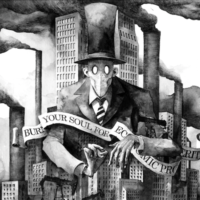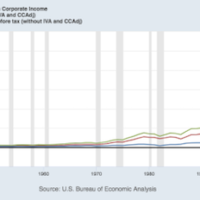-
‘Grévolution’: first round of a general strike
Since the middle of December, France has been gripped by a wave of large scale strikes. In this article the French collective Plateforme d’Enquêtes Militantes analyses the composition of the strikes, and the potential for its continued escalation.
-
Covering the Paradigm Crisis with Alexandra Scaggs
Alexandra Scaggs joins Money on the Left to discuss her experience covering the ongoing paradigm crisis in mainstream economics, central banking and finance—and why leftists should be paying close attention.
-
Australia’s profit-driven apocalypse
Some firefighters report flames 150 metres high. Read that again, slowly. Flames 150 metres high. Higher than a 40 storey building.
-
Don’t buy the “marketplace of ideas”
Economic imagery pervades societal discourse. Part of this imagery projects markets as existing everywhere; the common societal parlance sees talk of the car market, the grocery market, the computer market, or, simply, the market.
-
How getting rid of ‘shit jobs’ and the metric of productivity can combat climate change
Yes, we’ll be less efficient. But we’ll be happier, more useful and better able to tackle climate change.
-
The limits of capitalism
At this point in human history, the limits of capitalism and the limits of our species’ life on Earth have converged. We have never been here before, and we cannot go back.
-
Cornel West interview
Let’s begin with Prophesy Deliverance. What you do in this book is incredible. You draw from Martin Luther King, Malcolm X, then the famous Afro-centrist Professor James E. Cohn, and then the pragmatic tradition with which you were already familiar while you were doing PhD work at Princeton. Then you put them together and, much more importantly, you also do something extraordinary.
-
The current U.S. approach to nuclear weapons can only lead to armageddon—arms control provides the only path to peace
The decade ends with two major threats to humanity: global warming leading to a climate catastrophe and the threat of a nuclear war extinguishing our civilization.
-
From a dysfunctional world order to a sustainable future: an interview with Richard Falk
In the interview that follows, Richard Falk, an internationally-renowned scholar of Global Politics and International Law, offers his insights on the contemporary state of world politics and shares his radical vision of the future world order.
-
Is degrowth an alternative to capitalism?
In what follows, I will first briefly summarize the core arguments of the book, which promises to provoke important discussions on the matter of limits and subjects. Then I will reflect on the fuzziness of the primarily cultural conceptualization of capitalism, and argue that neither self-limitation nor degrowth qualifies as a mode of production, such that they could constitute an alternative to capitalism.
-
Dossier 24: The world oscillates between crises and protests
This dossier is dedicated to offering an assessment of the moment we find ourselves in today. Part 1 provides a quick overview of planetary affairs; and Part 2 there are more detailed reports from our offices on their respective regions: South Africa, India, as well as the Caribbean and Latin America.
-
Using Marx as a pejorative to defend the ease of doing business: analysing the World Bank’s attack on CGD
The recent attack by a Senior World Bank Official, against the Centre for Global Development (CGD) has been rightly publicised on social media, for failing to engage with critique and misconstruing it as ideology.
-
WhatsApp and fake news, or how to kill democracy
Fears and anxieties are used to create and diffuse fake news and manipulate the electorate. This is what happened at the last Brazilian election. A group of researchers studied the case in order to develop a method to deal with fake news.
-
Stealing the wealth of nations
The international ‘wealth protection industry’ has outgrown the ability of legislation to control it. Assisted by the digital world, money can now be rapidly moved around the world to the most favourable jurisdiction. This tax competition undermines the economies of many countries to the detriment of social services.
-
The perversity of the neo-liberal fiscal regime
When income growth slows down in an economy, so does the growth of tax revenue within the given tax regime. Since the government has certain expenditure obligations, to meet these obligations it has to either impose additional taxes or expand its fiscal deficit.
-
Marx’s concept of socialism
The discussions and debates that have accompanied the 200th anniversary of Karl Marx’s birth since 2018 have provided an important opportunity to re-examine heretofore neglected aspects of his political and philosophical legacy. Foremost among them is the extent to which his body of work provides conceptual resources for developing a viable emancipatory to capitalism in the 21st century.
-
A culture of reconciliation with nature
Christopher Caudwell, who died at age 29 fighting with the International Brigades in the Spanish Civil War, wrote: “Either the devil has come amongst us having great power, or there is a causal explanation for a disease common to economics, science, and art.” That disease, he recognized, was the self-alienation of humanity under capitalism
-
Sanders report shows how Millennial generation is ‘being punished with crushing student debt and low-paying jobs’
“In the richest country in the history of the world, we have an obligation to turn this around and make sure our kids live healthier and better lives than we do.”
-
End of the free trade myth
“Is that a big deal?”, some may ask. It is to those who have pushed for achieving the far-reaching liberalisation of trade in an unequal global order, first under the General Agreement on Tariffs and Trade (GATT), and then under the auspices of the agreements that established the WTO and defined and expanded its remit.
-
Taxing the surplus—not
There aren’t many ways ordinary Americans have a say in what happens to the surplus that determines their fate.



















